Find more information in the General Comments section of the assessment
Find more information in the Rating Validity tab of the assessment
- See More
- See More
- See More
- See More
- Good
- Adequate
- Marginal
- Weak
- Poor
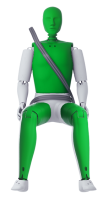 Passenger
Passenger
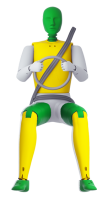 Driver
Driver
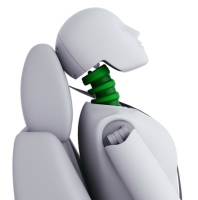 Front Seat
Front Seat
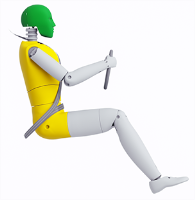 Car
Car
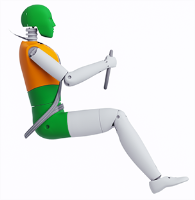 Pole
Pole
- Good
- Adequate
- Marginal
- Weak
- Poor
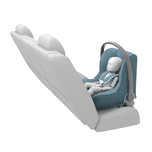
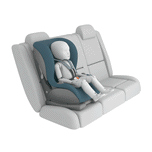
Passenger
outboard
center
Fitted to the vehicle as standard
Not fitted to the test vehicle but available as option
Not Available
Based on dummy readings in the dynamic tests, maximum points were scored for protection of the three year dummy. In the frontal test, forward movement of the 3 year dummy, sat in a forward facing restraint, was not excessive. In the side impact, both dummies were properly contained by their restraints, minimising the likelihood of dangerous head contacts. The passenger airbag can be disabled to allow a rearward facing child restraint to be used in that seating position. However, information provided to the driver regarding the status of the airbag is not clear and the system was not rewarded by Euro NCAP. The dangers of using a rearward facing restraint in the passenger seat without first disabling the airbag are not clearly labelled in the car.
- Good
- Adequate
- Marginal
- Weak
- Poor
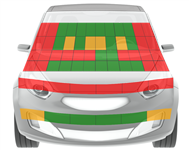
Head Impact 11.7 Pts
Pelvis Impact 0.0 Pts
Leg Impact 4.9 Pts
The bumper provided mostly good protection to pedestrians' legs. However, the front edge of the bonnet was poor in all areas tested and scored no points. In those areas where a child's head might strike, the bonnet provided poor protection. In those areas where an adult's head would strike, protection was mixed, some areas providing good protection and others poor.
- Good
- Adequate
- Marginal
- Weak
- Poor
| Performance | ||
| Vehicle Yaw Rate @ COS + 1.00 s | 2.271% | meets ECE requirements |
| Vehicle Yaw Rate @ COS + 1.75 s | 1.647% | meets ECE requirements |
| Lateral Displacement @ BOS + 1.07 s | 3.11 m | meets ECE requirements |
| Applies To | All seats | ||
| Warning | Driver Seat | Front Passenger(s) | Rear Passenger(s) |
| Visual | |||
| Audible | |||
|
|||
Electronic stability control is standard in most European countries but optional on some variants in some countries. Seat provided information to show that it will meet Euro NCAP's fitment requirements for 2011, and the system passed the test requirements. A seatbelt reminder system is standard for the driver, passenger and rear seats. A speed limitation device is not offered on the Mii.
- Specifications
- Safety Equipment
- Videos
- Rating Validity
Specifications
Tested Model Tested Car: VW up! 1.0, LHD
Body Type - 3 door hatchback
Year Of Publication 2011
Kerb Weight 855kg
VIN From Which Rating Applies - applies to all Miis of the specification tested
Class City and Supermini
Safety Equipment
Note: Other equipment may be available on the vehicle but was not considered in the test year.
Fitted to the vehicle as standard
Fitted to the vehicle as option
Not fitted to the test vehicle but available as option
Not Available
Not Applicable
Videos
Rating Validity


Find more information in the General Comments section of the assessment
The Seat Mii has been scrutinised by Euro NCAP and the car is structurally identical to the Volkswagen up! and has the same interior fittings. Seat has informed Euro NCAP that the Mii also has the same levels of safety equipment as the up!. Accordingly, Euro NCAP believes that the star rating of the up! can also be applied to the Seat Mii.
 Share
Share
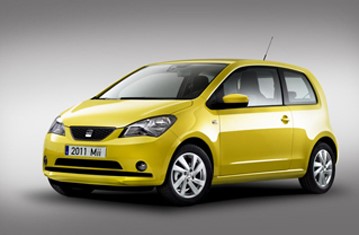



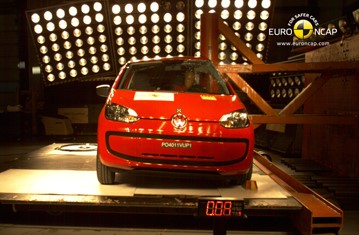





In the frontal impact, the passenger compartment remained stable. Maximum points were scored for protection of the passenger dummy. Dummy readings indicated good protection of the knees and femurs of both the driver and passenger. It was demonstrated that a similar level of protection would be provided for occupants of different sizes and to those sat in different positions. In the side barrier test, most body areas had adequate protection. In the more severe side pole impact, dummy readings of rib compression indicated marginal protection of the driver's chest. The seat and head restraint provided good protection against whiplash injuries in the event of a rear-end collision.